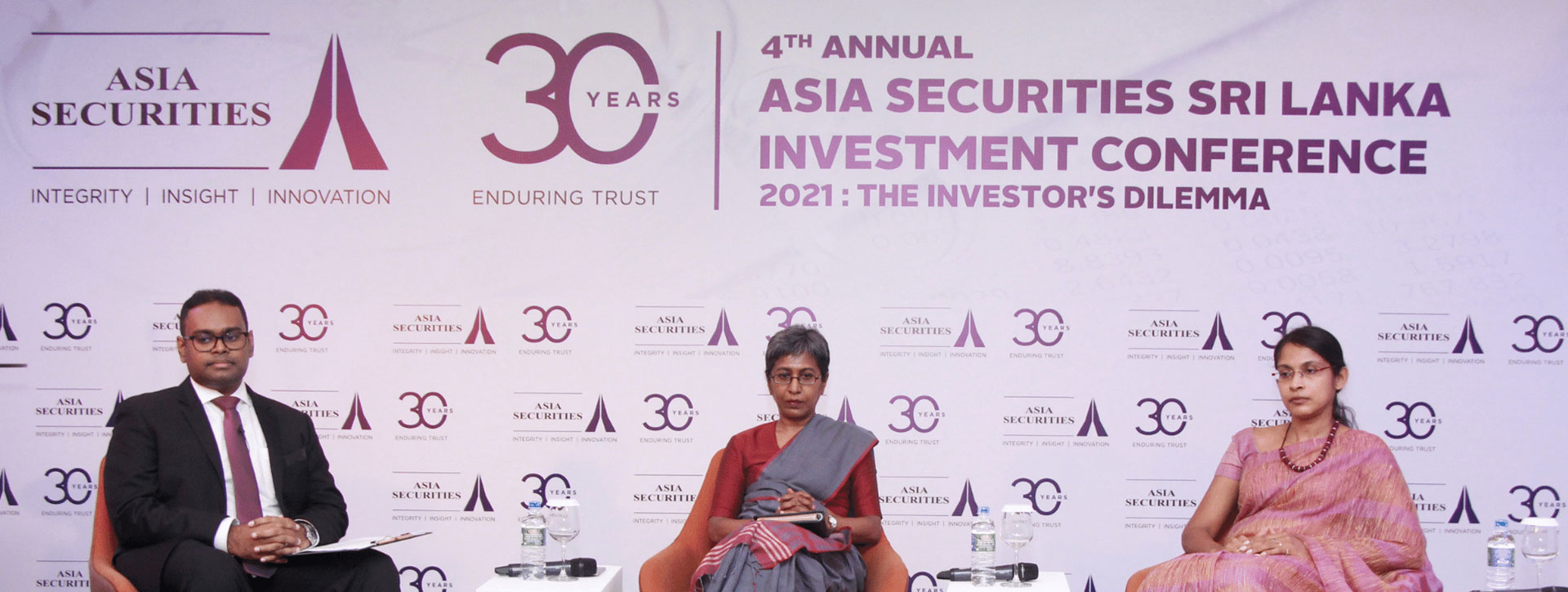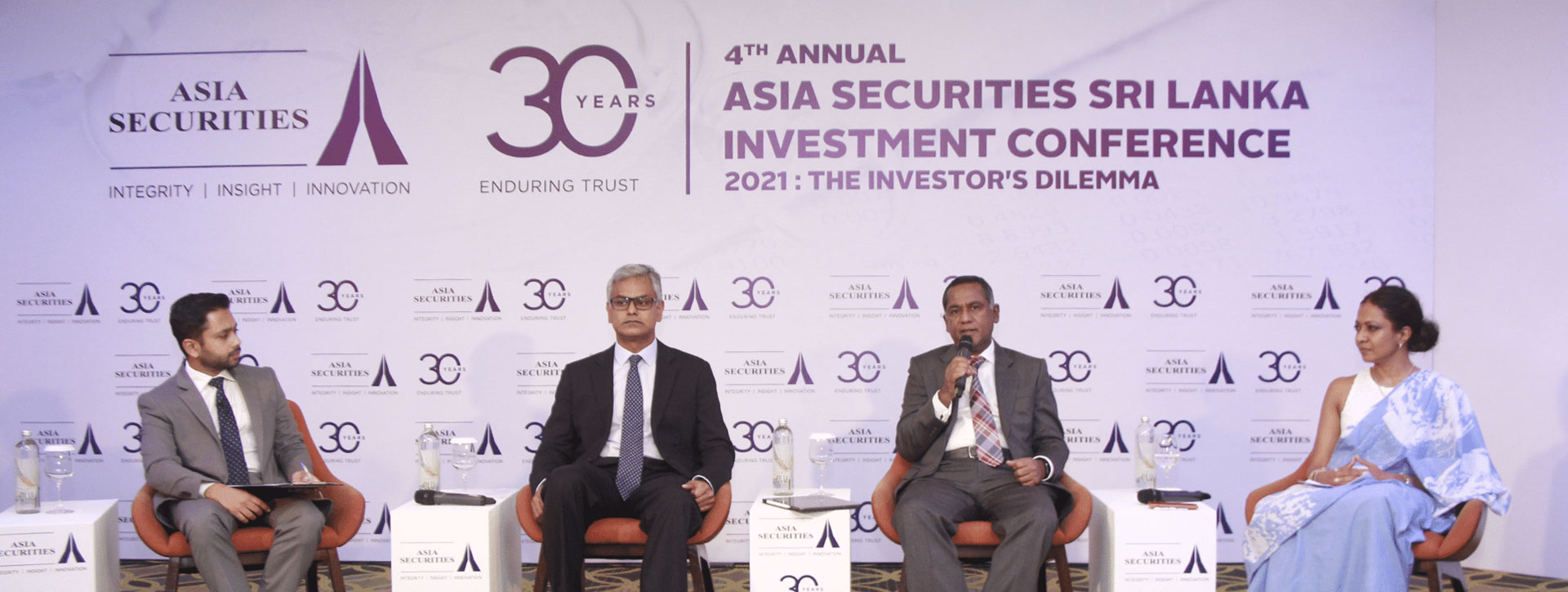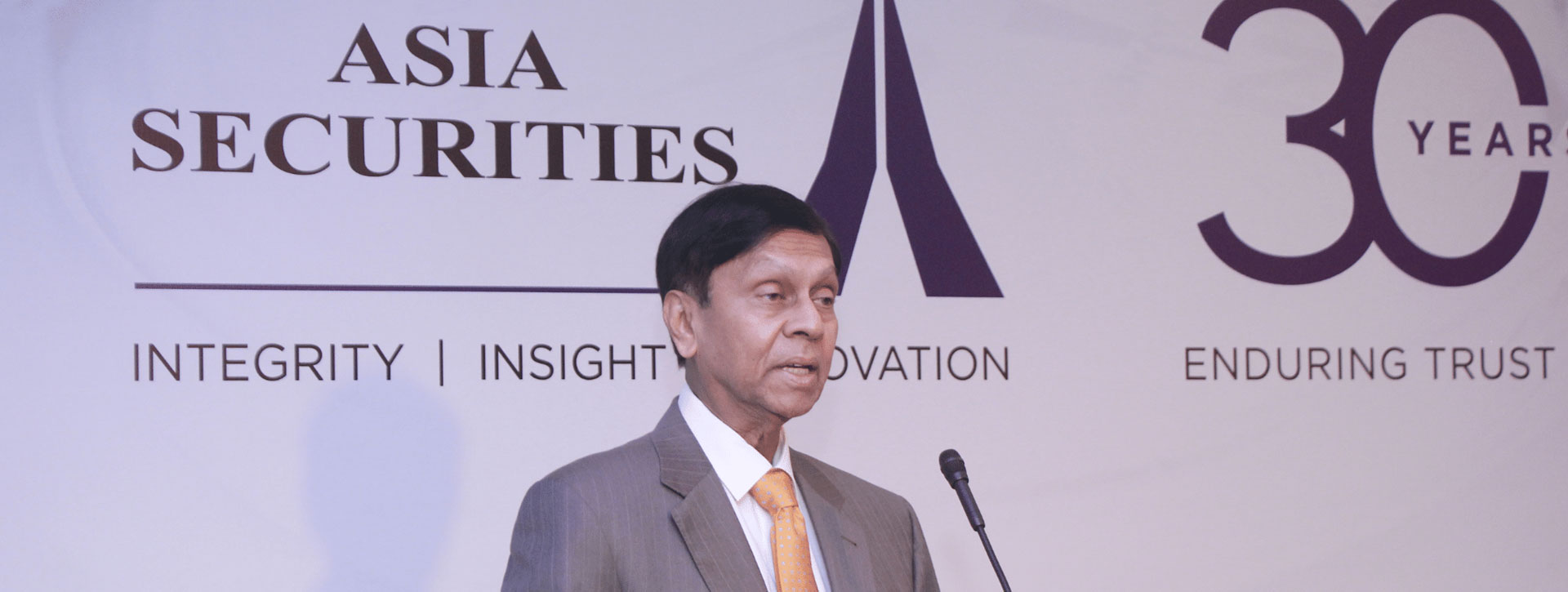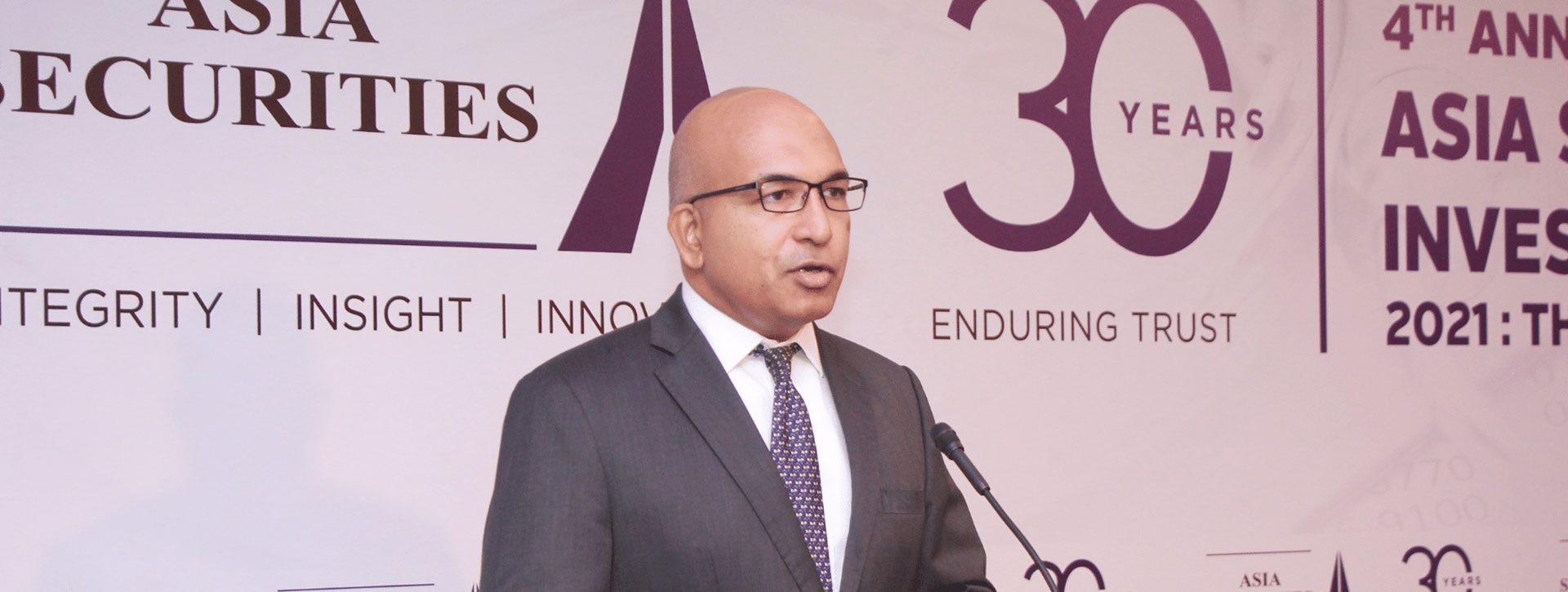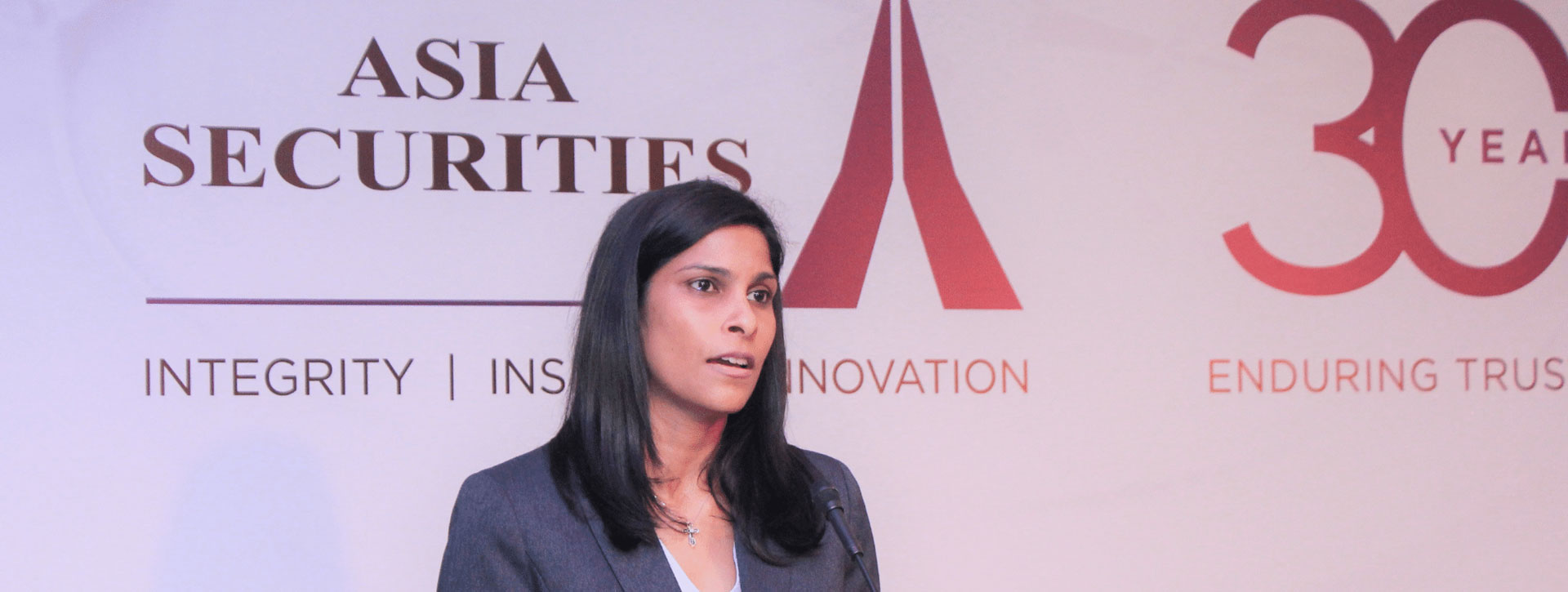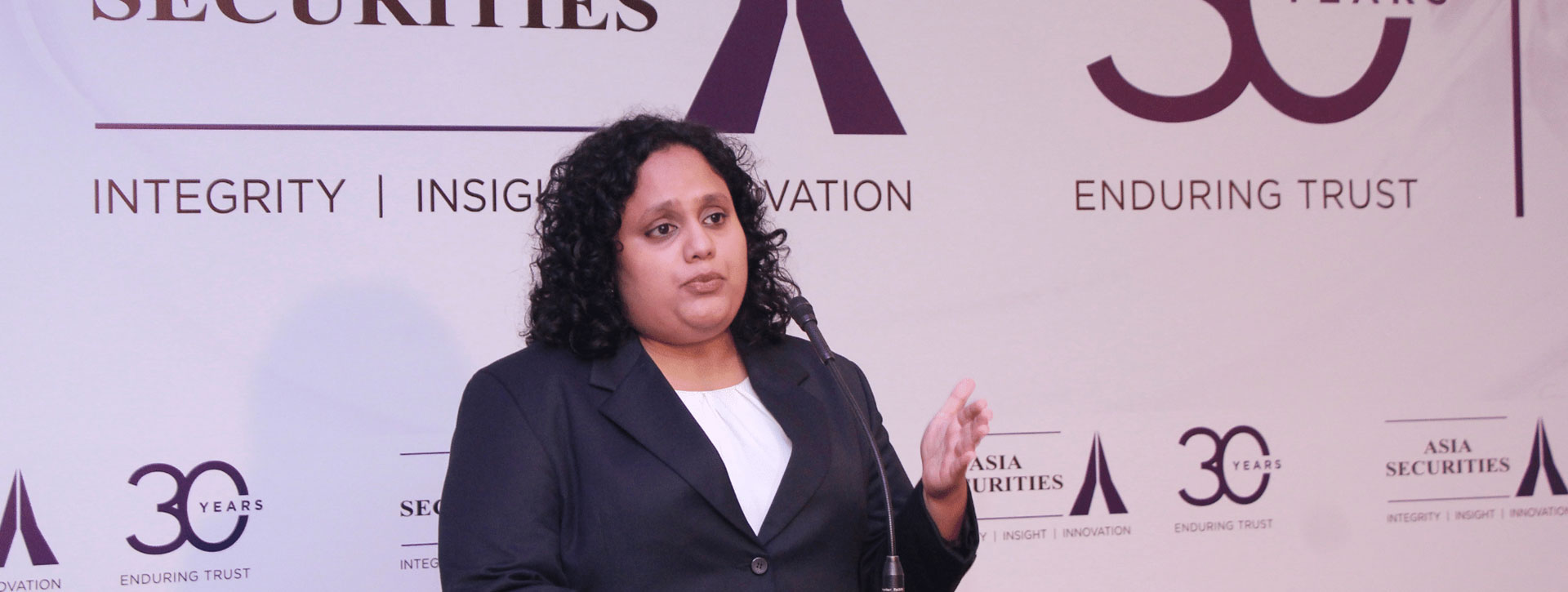Summary
- Ditch the public health vs economy debate; lasting economic recovery hinges on resolving the COVID-19 health crisis
- Gradual economic rebound on the horizon, however, definitive plans to boost investor confidence and maintain macroeconomic stability vital
- Low interest rate environment and market resilience drive equity-friendly outlook for 2021
Following what was a rollercoaster year, investors can meet 2021 with optimism – while retaining a degree of caution for the year ahead. Sri Lanka’s leading independent investment banking and wealth management firm, Asia Securities hosted its 4th Annual Sri Lanka Investment Conference from the 15th to the 17th of December 2020. This year's conference titled “2021: The Investors' Dilemma” explored the outlook for business and investment opportunities in Sri Lanka in three thought-provoking and insightful panels, garnering strong interest from the investor community. Global and local thought-leaders who joined this virtual conference explored a broad range of themes ranging, from the unfolding health crisis and opportunities arising from the pandemic-induced disruption in certain sectors, economic disparities and the need for inclusive growth.
The COVID-19 dilemma…is not a dilemma
The fight against COVID-19 has been widely framed as a trade-off between managing the ongoing public health crisis and salvaging the economy. An expert panel comprising Prof. Neelika Malavige, University of Sri Jayewardenepura; Dr. Ravindra P. Rannan-Eliya, Institute for Health Policy; and Dr. Dushni Weerakoon, Institute of Policy Studies of Sri Lanka, indicated that this a false dichotomy.
While news of the vaccine breakthrough is cause for optimism, it is vital to remember that testing and contact tracing will remain key to COVID containment. Dr. Rannan-Eliya stressed that expanding PCR testing capacity and contact tracing is more effective in combating the pandemic than a vaccine. He highlighted that, “Countries that have successfully eradicated COVID-19 outbreaks and brought them under control, are those that have aggressively increased PCR testing capacity. A vaccine, on the other hand, wouldn’t be as effective, because dosage volumes, especially for countries like Sri Lanka, would not be sufficient to achieve adequate herd immunity.” Dr. Rannan-Eliya also pointed out that when we speak of the efficacy of the current vaccines, this only refers to the prevention of symptoms and death in people, so it does not refer to prevention of transmission.
When asked about the timeline of the vaccine coming into the country Prof. Malavige stated that, “The ‘COVAX Program’ will cover 20% of the population and is expected to come in August/September 2021. The country will first receive 10% of the vaccines and remainder will arrive the following year. However, given the limited quantities of the vaccine, stopping transmission may not be possible.” Elaborating on the government’s intention to expand mass testing programme, Prof. Malavige stated that, “Testing capacity, which is currently operating at 14,000 tests per day, is expected to reach 40,000 - 50,000 tests per day in approximately a month.”
Speaking at the conference, Dr. Dushni Weerakoon noted that while the government has a medium-term policy framework in place, it now needs to look towards bridging the financing gaps created by high levels of public debt and widening fiscal deficits. She stressed that definitive plans are vital to boost investor confidence and maintain macroeconomic stability. Dr. Weerakoon further noted that economic recovery will hinge on stronger income and consumption growth stating that, “The initial impact to the economy from COVID-19 was a supply side shock. Now what we see is a demand side shock. People are not spending due to concern on livelihoods. To drive economic growth in the next year will require people going back into employment. However, the health risks are high, especially given that almost 68% of the labour market is from the informal sector. There will have to be a strong public health message that goes out to those workers to give them a sense of confidence that going back to work is not putting their lives at risk.”
Brighter prospects, some challenges
A stronger and sustained economic recovery is on the horizon in the coming year. Opening the second day of the conference with a global market 2021 outlook, Jonathan Wilmot, Global Strategist, Aletheia Capital, Founder, WilmotML, and former Chief Global Strategist, Credit Suisse stated that, “The forecast we have is for a short-term dip followed by a period of above trend growth which takes us back roughly to trend or slightly above by the middle of 2022. Essentially, we have already had our V-shaped recovery in global industrial production even though GDP remains well below pre-COVID levels. Key indicators are showing a lagged impact from the winter wave in the US and Europe. However, global industrial activity reached above our estimation of 80-85% of pre-COVID levels, thanks to China.”
Delivering his keynote address at the conference, Hon. Ajith Nivard Cabraal, State Minister of Money & Capital Market and State Enterprise Reforms, are expressed his optimism noting that, “Even with the COVID situation, Sri Lanka has been able to generate reasonable interest and robustness within the markets. Sri Lanka has adjusted to the ‘new norm’ reasonably well which can be seen in the 3Q GDP results.” Speaking about the balance between the health sector and the economy, he stated that “Sri Lanka has been able to strike a reasonably good balance in this sense. Sri Lanka will not seek funding from the IMF as the country hopes to manage with the available resources, and we have sufficient resources to get through 2021. We will also see wide consolidation program between the banks and finance companies, ensuring strong and stable institutions to take the country forward. Further, the economy is to expect investments to come into the economy.”
The Minister also stated, “The government believes that USD 2.5bn is an achievable FDI target for 2021 as commitments made for the Port City alone amount to USD 1.0bn. The Hambantota tire factory should generate ~USD 300mn, with at least USD 175mn expected in 2021. Investments in pharmaceuticals and education should be in the range of USD 200mn. Meanwhile, other investments are also continuing, and materialization of these inflows should encourage further investments. The public sector order book of investments amount to ~LKR 5.2tn, and even realizing 15.0% of this should amount to USD 780bn. Private sector participation has been facilitated even in the COVID-19 environment by maintaining stable macro fundamentals. Targeting 5.0% of GDP to come from FDIs by the latter part of the current government’s term is a tall order but achievable by setting the right foundation.”
Delivering his keynote address, Prof. Muhammad Yunus, 2006 Nobel Peace Prize Recipient and Founder of Grameen Bank highlighted that the pandemic-induced upheaval is a chance for nations to recalibrate their priorities and move towards inclusive growth. Prof. Yunus stated that, “The entire a banking system is designed around wealth accumulation. However, more than half the population of the world, categorized as the informal sector, is excluded from the formal financial system, and left at the mercy of the loan sharks. We classify them as the informal sector, but really these are micro-entrepreneurs, a segment that can take of themselves, if given the right support. Governments should design micro-financing policies that do not look at making money for ourselves, but instead look to support these entrepreneurs.”
Commenting on the low interest environment, Jonathan Alles, Managing Director/Chief Executive Officer, Hatton National Bank PLC, noted that “Two to three years back, AWPLR was ~12.5%. We have seen this come down a two-third of it and it is at an all-time low at this stage. Given the current context of the country, this makes sense as there is minimal activity going on in the economy. The good thing about this is, even if rates go up marginally, is that it would be sustainable still and good for the depositors. However, it is important the banking industry rides this through successfully given the current low interest rate environment.”
Investing Beyond the Pandemic
Day 3 of the conference focused on the key equity plays for 2021 in the backdrop of its macroeconomic outlook. Representing three leading listed Sri Lankan companies, a stellar panel comprising Krishan Balendra, Chairman, John Keells Holdings PLC; Nanda Fernando, Managing Director, Sampath Bank PLC; and Kasturi Chellaraja Wilson, Executive Director/CEO, Hemas Holdings Plc, spoke of business risks under the new normal and the focus areas for 2021, with emphasis placed on continuing investment engines while ensuring cash preservation.
Asia Securities’ Macroeconomist Lakshini Fernando kick-started the event with an in-house view macro-outlook for 2021. She noted that, “While we see the government’s focus on a domestically driven growth agenda and the current low interest rate environment as positives going into 2021, our main concerns are on the government’s USD 4.9bn refinancing schedule amidst a widening fiscal deficit. What will also negatively impact us is a prolonged impact of COVID-19 going into the new year. Foreign Direct Investments will be crucial for 2021, and we factor in USD 1.5bn of net FDIs into our calculations; a relatively conservative estimate compared with the Government’s USD 2.5bn expectation. Anything above our forecast will be a clear positive to help the country’s reserve position in 2021.”
Assessing the outlook for the local economy, Ms. Fernando noted “On the economic front, Asia Securities sees overall growth increase to 5.4% YoY in 2021, with a more conducive consumption and investment backdrop. While the fiscal deficit will see pressure in the near term, with corrective policies implemented form 2022 onwards will help bring the overall deficit down to 9.2% of GDP by 2023. A crucial part of the equation to medium term growth momentum will be an upward rerating of the country’s credit profile.”
Ms. Fernando’s presentation was followed by Asia Securities’ 2021 Equity Outlook presented by Naveed Majeed, Co-head, Asia Securities who stated “With low interest rates expected to remain in the medium-term, we expect equities to deliver strong returns in 2021. Several of the large-cap sectors are yet to recover from their losses suffered over the course of the pandemic – we see this is an opportunity for investors to position themselves given that the economy is at an inflection point. We also expect household consumption to be the first area to pick up in 2021 and this will help the names within the consumer sector space, as the recovery unfolds.”
Mattias Martinsson, Chief Investment Officer/Founding Partner at Tundra Fonder AB and longtime investor in Sri Lanka’s capital market took the stage to explores the challenges and opportunities of investing in frontier markets. He highlighted that “Being a country with the highest debt/GDP levels in the frontier arena, Sri Lanka’s debt repayment situation remains a risk for foreign investors. Amidst two shocks to services, first from the Easter Attacks and now COVID-19, the biggest fear on a foreign investors’ mind is how this will affect the currency and upcoming payments. However, Sri Lanka remains one of the cheapest frontier equity markets.”
The final panel for the day was opened by Kasturi Wilson of Hemas Holdings PLC who highlighted the importance of capitalizing on opportunities arising from the present uncertainty, while being mindful of cash preservation, “I take the view that uncertainty is the new norm. In uncertain times cash is important, but you need to keep your investment engine going. We will lose out in the medium term if we do not invest at this point. Industries that are most impacted might have more emphasis on cash to ensure minimum disruption to employees and business operations. Based on the portfolio we have, other businesses do have tailwinds where consumer trends are leading the charge in terms of growth opportunities.”
Responding to a question on the impact of East Container Terminal (ECT) on the operations of South Asia Gateway Terminals (SAGT), Krishan Balendra of John Keells Holdings PLC stated, “When the ECT is operational, it will be similar to when CICT commenced operations in 2013. The port was at full capacity utilization at the time, and CICT increased capacity by 50%. Initially, volumes at South Asia Gateway Terminals (SAGT) fell due to the overcapacity. However, the CICT capacity was absorbed very quickly which shows Colombo’s potential as a trans-shipment hub for South Asia and the region. ECT will increase capacity by around 25%; not a sudden jump like when CICT came in. In the short term, SAGT’s volumes and profitability could be impacted but we think that capacity will be absorbed quite quickly.”
Nanda Fernando of Sampath Bank PLC also voiced his thoughts on the post-COVID19 shifts in Sri Lanka’s operating environment stating, “We expect Sri Lanka’s private sector credit growth to improve in early 2021. This might have an impact on interest rates, but we do not expect the increase to come until at least the latter end of 2021. However, credit growth improvement depends on the rate at which global consumption and investment begins growing at as well. On a separate note, we have seen ~90% of our transactions shift to the electronic channels; ~33% of the electronic channel transactions happening through Sampath Bank Online Banking. Moreover, Sampath Bank has a 55% market share in Visa and Master Card E-Commerce transactions.”
Hosted by the Asia Securities’ award-winning Research team, the Annual Sri Lanka Investment Conference series is an integral part of Asia Securities’ calendar, that focuses on in-depth discussions with veterans in industry and policymaking and has garnered significant investor interest in the last few years.
Past Events
- Wealth Insights Series: Insurance – Insurance Sector Opportunities
- Wealth Insights Series: Banks – An Evolving Story of Elephants and Cheetahs
- Wealth Insights Series: Construction – Transitioning from Infrastructure to Residential
- Wealth Insights Series: Macroeconomics – Sri Lanka in 2016 – Macro & Political Outlook
- InsideTrack: Textiles – Brandix CEO Ashroff Omar sees the apparel sector maintaining its strong growth momentum





